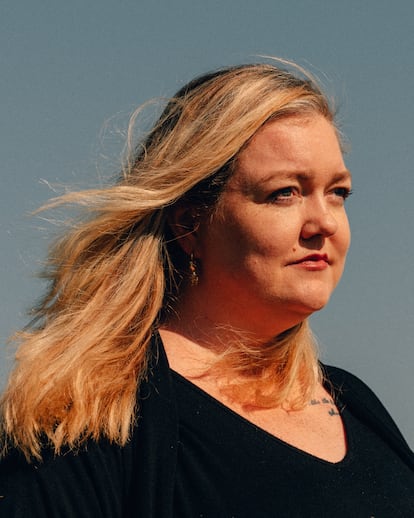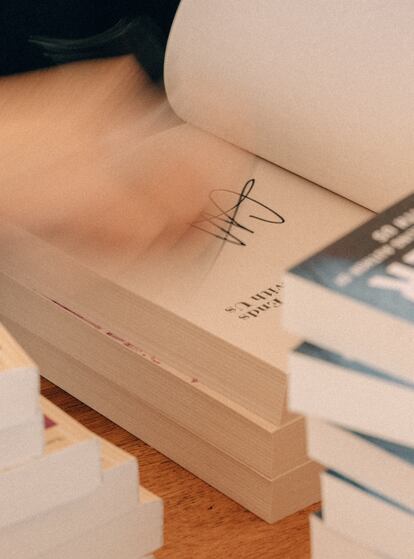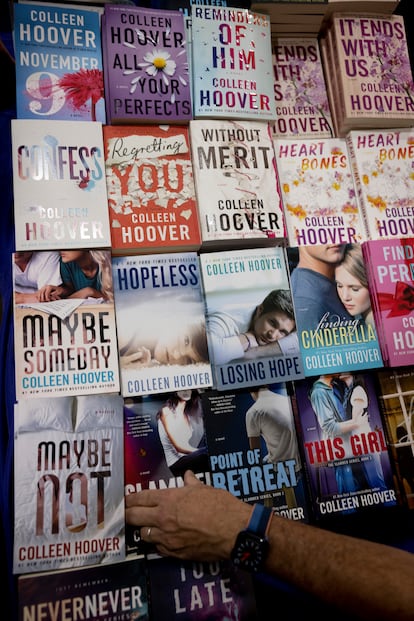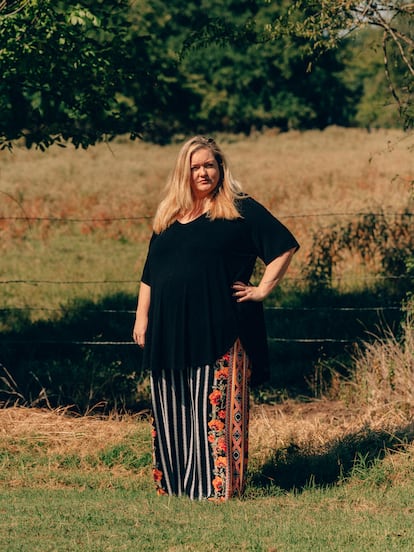Colleen Hoover: The world’s bestselling author hails from a ranch in Texas
The 42-year-old writer is ruling the bestseller lists, ahead of J.K. Rowling, John Grisham and Stephen King. She has sold 20 million books, in which she blends fiction with traumas from her own life

The first signs that something unusual was afoot in the book world began a decade ago and came to a head during the pandemic, when many sought refuge in reading. Little by little, an unknown woman by the name of Colleen Hoover had been writing and self-publishing successful novels until she became the bestselling writer of all time. With 20 published titles, her book sales have exceeded 20 million copies. The phenomenon reached unprecedented proportions last October with the publication of her latest novel, It Starts with Us. When it came out, the book went straight to the top of all the bestseller lists, leaving a trail of previously published titles in its wake.
That week it looked as though The New York Times bestsellers list had been taken over by a hacker paid by the author: nine of her books were among the 15 top fiction titles. Even more striking was the length of time they had been in the top; some of her books had returned to the bestseller list after years of absence. The only novelty was the brand new, number one bestseller, which sold 800,000 copies (out of an initial print run of 2.5 million) on the first day. The novel’s origin is unusual. Hoover wrote it to please her fans; for years, they’d been begging for a sequel to It Ends with Us (2016), her most celebrated title, with four million copies sold. After a year and a half on The New York Times list, it was relegated to second place by It Starts with Us. Verity, a thriller that combines mystery and romance, sat in third place; it spent a year and three months there. Ugly Love was fourth on the list, where it held a spot for over 14 months... Hoover’s books also occupied the 6th, 9th, 10th, 12th and 14th positions. The novels remained there from two months to just over a year. And so it went, week after week, with some variations. In 2022, three of her books reached the top of the bestsellers list.
Colleen Hoover, 42, was born in Sulphur Springs, Texas. Her parents owned a small ranch near the town of Saltillo (about 90 miles from Dallas) where they tended to about 50 cows. According to the author’s statements on TikTok, when she was asked as a child what she wanted to be when she grew up, she invariably answered that she wanted to be a writer. Her first story, Mystery Bob, written at the age of five, is about a mysterious individual who sets out on a quest to find five rings. During her adolescence, in addition to attending high school, Hoover worked on the ranch, milking cows. At the age of 20, after earning her degree in social work, she married her high school sweetheart, a truck driver by trade. The couple moved into a trailer, where they raised their three children. To stave off boredom, she occasionally took her mother’s laptop and wrote on the sly. One day, while her seven-year-old son was rehearsing a play at school, she came up with a novel about a teenage girl who, traumatized by her father’s untimely death at age 32, falls in love with her teacher and seeks refuge in slam poetry. A month later she finished her first novel, Slammed. Hoover rushed to finish it because she wanted her mother to read it on the tablet she’d given her for Christmas. On New Year’s morning 2012, at 31, she self-published the book on Amazon. The first day she had six downloads; the second, 60. Then, the dam broke, and Hoover became unstoppable.
History repeated itself six months later when she published the sequel, Point of Retreat. Based on these results, she hired an agent, but takes two books out of their hand without them noticing. By August, both novels had burst onto the US bestseller lists. True to character, Hoover self-published her third title. Instinctively understanding the importance of cultivating a digital audience, Hoover was astute enough to give readers free access to five of her titles in e-book format. After devouring the novels, readers bought them in print. The sixth title, Finding Cinderella, was also released in an e-book version, but readers protested and demanded a physical book. Faced with a barrage of tweets, complaints and threats, the publisher eventually relented and added Hoover’s own real-life Cinderella story as an epilogue.

Hoover’s career skyrocketed with the 2016 publication of It Ends with Us. Her fans nicknamed the author CoHo and labeled themselves her cohorts. Hoover’s dizzying ascent continues to this day. Of the 20 million total copies she has sold, half were purchased in 2022. The phenomenon has completely changed what is understood as literature as well as what it means for a book to be a mega bestseller. Hoover outsells the likes of bestselling authors James Patterson, John Grisham, J. K. Rowling, Stephen King and E. L. James, the author of Fifty Shades of Grey, with whom Hoover has become friends. The CoHo phenomenon has attracted the attention of psychologists who study the masses; they are trying to analyze Hoover’s amazing ability to connect with the most basic feelings of people who do not normally read. Both the viral videos posted by her fans and the live presentations of her books are delirious spectacles. Her fans travel from far away places, ready to stand in several-hour-long lines amid towers of books to wait for the author to sign their copies. Hoover’s fans record their reactions on “bookstagrams” and in videos where they appear with trembling hands, as if in a trance, or thanking her, laughing or sobbing inconsolably. When Reminders of Him came out in early 2022, a fan posted a seven-second video online that just showed the book’s cover; it garnered 700,000 views. The most significant aspect of the CoHo phenomenon takes place in the virtual world. Hoover has legions of followers on BookTube, InstaBook, and BookTok, the YouTube, Instagram, and TikTok niches dedicated to books. Hoover’s social media impact is unparalleled: she has nearly two million followers on Instagram and one million on both TikTok and Facebook, where she has an entourage of 170,000 cohorts. She also has 200,000 followers on Twitter; while the #Colleen Hoover hashtag on TikTok has been viewed nearly three billion times.
The root of this phenomenon is emotional. The writer’s great discovery was the existence of virtual communities made up of legions of readers eager to share their traumas, longings and frustrations. The advent of the Covid-19 pandemic had an enormous impact on these communities, paving the way for new digital platforms to change the rules of the game. A vibrant literary subculture emerged as a result of the coronavirus lockdown. It is worth noting that over 40% of BookTok users are between 16 and 24 years old; most women eager to share their opinions about the books they read, and the recommendations they make translate into millions of dollars in sales. When someone recommends a novel on BookTok, an algorithm kicks in that leads to skyrocketing interest in the book. Of course, the publishing industry keeps an eye on readers’ activities and sometimes contacts influencers to pay them to recommend books. But that’s not enough to explain the Colleen Hoover phenomenon. Large bookstores and supermarkets have promotional tables and shelves dedicated exclusively to her. For her part, the author posts one-minute videos in which she gives advice to new generations of readers; beyond discussing her books, Hoover talks about herself and her problems.
A particularly striking aspect of TikTok’s impact on mass book sales is what we might call the rebound effect, that is, past bestsellers make a comeback and generate even more interest than when they were first published. Such has been the case for, among others, Hanya Yanagihara’s A Little Life; Madeline Miller’s The Song of Achilles; Matt Haig’s The Midnight Library; and, of course, books by Colleen Hoover, who saw the sales of works she had published years ago increase astronomically. There are other factors to consider as well. One of the most intriguing elements is her books’ ability to arouse primal emotions such as weeping. Numerous videos posted on TikTok show her readers filming themselves sobbing inconsolably, displaying their anxiety and need to share their emotions.

Success has taken its toll on Hoover, turning her in to something of a recluse. After blocking all contact with the press and steadfastly refusing to make any statements, she canceled her latest book’s scheduled tour, much to the chagrin of her fans, although that has not affected sales. As an exception and at the request of her editors, Hoover agreed to briefly answer a very short list of questions via email exclusively for EL PAÍS. How does Colleen Hoover explain the power her books have over millions of people who claim that reading them changed their lives forever? “I write books I want to read, and if there’s an audience out there for it, that’s wonderful. I never intend to bring up difficult subjects, it’s just where the readers take me as I write their story. I like to read for entertainment, and I like to write to entertain.” Much of the secret to her success is no doubt related to her ability to echo traumas experienced by people like herself. Hoover explains it this way: “It’s difficult to write about humans without including [the] human experiences we all go through. I think a lot of people can find inspiration from a mother who removes herself from a domestic violence situation. I am sure many readers relate to Lily’s journey in It Ends with Us, or at least know someone who does for the same reason.”
Can she pinpoint the secret to her success? “What can I say! Who can expect that! I am very thankful to my readers for their support. When It Ends with Us was released in 2016, I thought it did well, but I definitely give the credit to BookTok and the readers who rave about the books they love openly there.” In any case, it is clear that Hoover has mastered the rules of the game. In addition to publishing simultaneously with three different publishers, she continues to self-publish. Another feature that sets her apart is that, unlike other professional best-selling writers, Colleen Hoover does not stick to a fixed formula for success that she knows will work. Her novels incorporate a wide range of genres, from sentimental romances to psychological thrillers to chronicles of paranormal phenomena. Her plots exploit extreme emotional situations: trauma, abusive relationships, sexual harassment, tormented loves, survival stories, infertility, cruelty and abandonment. The author includes abundant doses of sex, domestic violence, psychological torture, frustrations of all kinds and melodrama into her work.
Hoover does not have an established work routine; she writes when she feels like it. She alternates months of inactivity with 12-hour days of hectic writing. In fact, she often spends more time signing books than writing them. Does she know where she’s going when she starts a novel, or does she just follow her intuition? She admits that “the process is different with every book, as sometimes the inspiration comes all of a sudden and most require a lot of willpower.” What about the deadlines she is asked to meet to avoid interfering with sales? “I can’t make any plan, even if I pass a deadline, because I love the joy of writing and I don’t want to miss that.”

Trying to apply the standard literary criteria to Colleen Hoover’s work misses the point. Some commentators have pointed out that her characters fit a certain pattern: they are white, cisgender (that is, they identify with the gender they were assigned at birth) and heterosexual. But the author is completely unconcerned about these issues; the only opinion that matters to Hoover is that of her readers. According to her fans, reading a Colleen Hoover novel is a dizzying experience, which the author says is a consequence of her attention deficit disorder. The same goes for other flaws. Lily, the protagonist of It Ends with Us, is a florist trying to break out of the cycle of violence and psychological abuse inflicted on her by her lover, Ryle, a brilliant neurosurgeon. Pregnant with his child, she seeks refuge in an old flame, Atlas, a celebrity chef. The tormented love story between the surgeon and the florist was inspired by her mother’s abusive relationship; she was a victim of her husband’s brutal treatment, which the author herself witnessed as a child. How is it possible that such a successful novel left millions of readers unsatisfied to the point of demanding a sequel? The author speaks of her characters as if they were flesh-and-blood individuals: “The readers begged for the story to continue, but I did not want to redeem Ryle, just putting that out there. Lily and Atlas have both been through a lot, so I wanted them to have some good times together in the book. They are each going through their separate issues in the book, but together, they give one another strength.”
Judging by the resulting sales, readers had as much fun as the author did. But an unresolved enigma remains at the heart of the Colleen Hoover phenomenon. The key to her success is as much a mystery to her publishers as it is to the author herself; at one point, Hoover went so far as to state that “writing a novel is a matter of getting as far as you can from the first page to the last.” As far as literary models are concerned, she cites Tiffanie DeBartolo’s How to Kill a Rock Star as the best book she’s ever read. Asked whether there is a magic formula that explains what makes for a good story, her answer couldn’t be clearer: “I have no idea.”
Sign up for our weekly newsletter to get more English-language news coverage from EL PAÍS USA Edition
Tu suscripción se está usando en otro dispositivo
¿Quieres añadir otro usuario a tu suscripción?
Si continúas leyendo en este dispositivo, no se podrá leer en el otro.
FlechaTu suscripción se está usando en otro dispositivo y solo puedes acceder a EL PAÍS desde un dispositivo a la vez.
Si quieres compartir tu cuenta, cambia tu suscripción a la modalidad Premium, así podrás añadir otro usuario. Cada uno accederá con su propia cuenta de email, lo que os permitirá personalizar vuestra experiencia en EL PAÍS.
¿Tienes una suscripción de empresa? Accede aquí para contratar más cuentas.
En el caso de no saber quién está usando tu cuenta, te recomendamos cambiar tu contraseña aquí.
Si decides continuar compartiendo tu cuenta, este mensaje se mostrará en tu dispositivo y en el de la otra persona que está usando tu cuenta de forma indefinida, afectando a tu experiencia de lectura. Puedes consultar aquí los términos y condiciones de la suscripción digital.








































